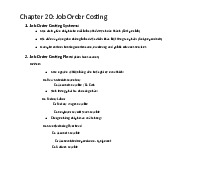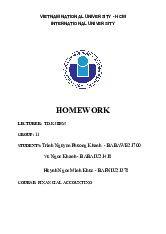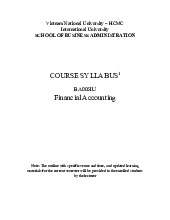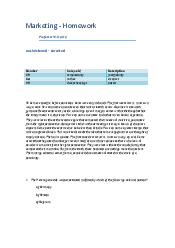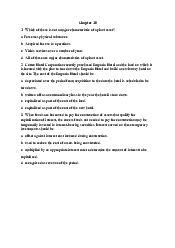





Preview text:
VIETNAM NATIONAL UNIVERSITY HO CHI MINH CITY INTERNATIONAL UNIVERSITY School of Business COURSE SYLLABUS
PRINCIPLES OF MANAGEMENT 1. Faculty information: 1.1. Instructor: 1.2. Office: 1.3. Office Hours: 1.4. Contact: 1.5. Teaching Assistant: 2. Course Information 2.1.
Course Title: Principles of Management 2.2. Credits: 03 2.3. Prerequisite: None. 3.
Course Objectives and Learning Outcomes 3.1. Objectives
The objective of the course is to provide students with the fundamental theories and
concepts of management as they apply within the contemporary work environment. The course is
an introduction to the basic concepts on planning and controlling, organization, leadership and
motivation. The course will review the different management approaches and the challenges for
management in the 21st century. 3.2. Learning Outcomes
Upon successful completion of the course, students will be able to:
Understand what a manager does in a high-performance organization in the dynamic new workplace environment;
Understand 04 management functions of planning, organizing, leading and controlling;
Understand the challenges and opportunities facing organizations today such as
globalization, diversity, technology and social responsibility;
Understand the difference between management and leadership in contemporary organizations;
Understand how the basic concepts from leadership, communication and motivation
theory apply to organizational leadership;
Develop the ability to research and analyze the managerial practices of an organization through a teamwork project. 4. Expectations 4.1.
Attendance: students are required to attend at least 80
percent of class meetings in order
to take the final exam. However, in order to take full benefit of this course, students are strongly
encouraged to attend every class meeting. 4.2.
Workload: It is expected that students will spend at least six hours per week studying
this course. This time should be made up of reading, doing research, working on assignments,
preparing for presentation and attending classes. 2 4.3. Responsibilities:
Please show respect to the instructor and classmates. o Be ON TIME. o
In case that you need to go home for emergency, please inform your instructor. If you
leave without permission, you will be marked ABSENT for that class.
Do NOT disturb the instructor and classmates by using electronic devices in classroom.
Please contribute ideas to questions raised. This class strongly emphasizes on the interaction
between students and instructor.
Check your Blackboard account regularly. Assignments, projects and notifications will be posted
on IU’s Blackboard. You log in to your Blackboard account using this link: blackboard.hcmiu.edu.vn Email rules: o
Do NOT leave the Subject field blank o
Provide your name, your student ID o
Details must be written in the Content field in English o
Please be professional in email communication. Make sure you think twice before
writing. Also, make sure you double-check for grammar and vocabulary errors before sending it
out (turn on the spelling check tool in your email account)
I will NOT reply to your email if you are not following this format.
Submit all assignments on time. Late submission will be 0.
Cheating in any kinds will NOT be tolerated and will be penalized . If caught copying others’
work, students’ grade will be automatically zero. Copying others’ work includes copying and
pasting from Internet/paper sources without giving credits; copying and pasting from other
people without giving credits; and copying from classmates. 5. COURSE ASSESSMENT 5.1 Formal Requirements
In order to pass this course, the students must:
Achieve a composite mark of at least 50; and
Make a satisfactory attempt at all assessment tasks (see below). 5.2 Assessment Details
In-class activities/Assignments 30% Mid-Term Exam 30% Final Exam 40% Total 100% 5.2.1 Assignments (30%) 3
(1) Group presentation (10%)
For each session, groups will be assigned to present a chapter in course book or other reading
materials. You are free to make group in a rule of thumb maximum for five students. You are
expected to prepare a fruitful presentation with conveying the main content of a assigned chapter.
(2) Class participation (10%)
You are expected to make questions or answer questions during the course. Anytime a single
student contributes the idea, you receive 1 point.
(2) Group Project (10%) You join a team of maximum 5 students to do a project of researching
and analyzing the managerial dimensions of an organization of your choice (further guidelines to be provided).
5.2.2 Mid-term Exam (30%)
The midterm exam will be in the form of multiple choices and open questions or problems. It is an open-book exam. 5.2.3 Final Exam (40%)
The final exam will be in the form of multiple choices and open questions or problems. The open
or closed book exam will be announced at the end of the semester. 6 Student Resour ces
Textbook: Schermerhorn, J. R. (2013). Introduction to Management, 12th edition, John Wiley & Sons, Inc.
Additional materials provided in Blackboard: The lecturer will attempt to make lecture notes
and additional reading available on Blackboard. However, this is not an automatic entitlement for
students doing this subject. Note that this is not a distance learning course, and you are expected
to attend lectures and take notes. This way, you will get the additional benefit of class interaction and demonstration. Recommended Journals
Academy of Management Journal Journal of Management Studies Management Science Journal
Journal of Small Business Management Harvard Business Review 7 Course Schedule 4 Session Topic Learning materials and activities 1
Introduction to Management Textbook Chapter 1 2
Management Learning Past to Present Textbook Chapter 2 3
Environment, Innovation, and Sustainability Textbook Chapter 4 4
Global Management and Cultural Diversity Textbook Chapter 5 5
Planning Processes and Techniques Textbook Chapter 8 6
Control Processes and Systems Textbook Chapter 9 7
Organization Structures and Designs Textbook Chapter 11 8
Leading and Leadership Development Textbook Chapter 14 MIDTERM EXAMINATION 9
Strategy and Strategic Management Textbook Chapter 10 10
Organization Culture and Change Textbook Chapter 12 11 Individual Behavior Textbook Chapter 15 12
Motivation Theory and Practice Textbook Chapter 16 13 Teams and Teamwork Textbook Chapter 17 14
Communication and Collaboration Textbook Chapter 18 15 Course Review FINAL EXAMINATION
THE GUIDELINES FOR TEAM PAPER (It is subject to change) 5
Requirement: Select and analyze an organization. The selected organization can be a company
which you learn from internet research, books or any readings or which you have known. The
paper should address the following issues. 1. Organizational strategy a.
What is the mission of the organization? b.
Define and assess the strategy of the organization. 2. Organizing a.
What is the structure of organization (organizational chart)? b.
Describe the decision-making process 3. Leadership style a.
Describe the motivational environment. b.
Assess the effectiveness of the organizational communications. 4. Control a. What is the type of control? b.
Describe the operational/financial controls 5. Any new managerial practices a.
Note technology utilization, ethics, diversity, employee empowerment, etc. applied by the organization
Methodology: research (internet, case studies, books) and select a case for this analysis. You
may interview the employees of a company if you choose it locally.
Length: max 15 pages including appendices.
Presentation: Slide presentations will be presented by groups in the classroom during the last three dates of the course.
Submission: A written paper must be submitted on the last date of the course. 6
